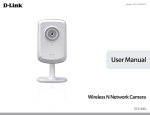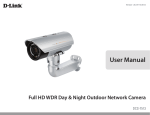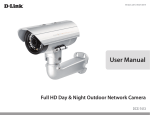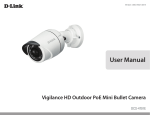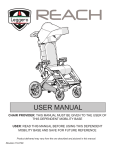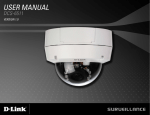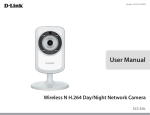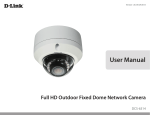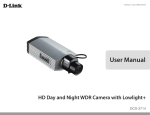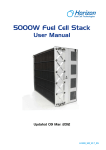Download User manual - CNET Content Solutions
Transcript
Preface D-Link reserves the right to revise this publication and to make changes in the content hereof without obligation to notify any person or organization of such revisions or changes. Information in this document may become obsolete as our services and websites develop and change. Manual Revisions Revision Date 1.0 July 10, 2012 Description DCS-7413 Revision A1 with irmware version 1.00 Trademarks D-Link and the D-Link logo are trademarks or registered trademarks of D-Link Corporation or its subsidiaries in the United States or other countries. All other company or product names mentioned herein are trademarks or registered trademarks of their respective companies. Copyright © 2012 D-Link Corporation. All rights reserved. This publication may not be reproduced, in whole or in part, without prior expressed written permission from D-Link Corporation. D-Link DCS-7413 User Manual 2 Table of Contents Product Overview......................................................................... 4 Package Contents ................................................................. 4 Introduction............................................................................ 5 System Requirements ......................................................... 5 Features .................................................................................... 6 Hardware Overview ............................................................. 7 Front ...................................................................................... 7 Sides ...................................................................................... 8 Cable Harness..................................................................... 9 Internal ...............................................................................10 Assembly and Installation .......................................................11 Installing an SD Card .........................................................11 Mounting the Camera .......................................................13 Attaching the Camera to the Wire-in Bracket.......14 Orienting the Camera....................................................16 Deploying the Camera ..................................................17 Camera Installation Wizard .............................................19 Connection with 12 V DC Power Adapter ..............19 Connection with 24 V AC Power Wiring..................20 Connection with Power over Ethernet....................21 Software Installation......................................................22 Coniguration ...............................................................................25 Using the Coniguration Interface ................................25 Live Video ..............................................................................26 Setup .......................................................................................28 Setup Wizard ....................................................................28 D-Link DCS-7413 User Manual Network Setup .................................................................34 Dynamic DNS ...................................................................37 Image Setup .....................................................................38 Audio and Video ..............................................................40 Preset...................................................................................42 Motion Detection ...........................................................44 Time and Date ..................................................................45 Event Setup .......................................................................46 SD Card ...............................................................................54 Advanced...............................................................................55 Digital Input/Output......................................................55 ICR and IR ...........................................................................56 HTTPS ..................................................................................57 Access List..........................................................................58 Maintenance.........................................................................59 Device Management .....................................................59 System ................................................................................60 Firmware Upgrade..........................................................61 Status ......................................................................................62 Device Info ........................................................................62 Logs .....................................................................................63 Help......................................................................................64 DI/DO Speciications .................................................................65 Technical Speciications ...........................................................66 3 Section 1: Product Overview Introduction Congratulations on your purchase of the DCS-7413 Full HD Day & Night Outdoor Network Camera. The DCS-7413 is a professional surveillance and security solution for small, medium, and large enterprises alike. The DCS-7413 uses a 2 megapixel progressive scan CMOS sensor; the professional sensor results in low noise and high sensitivity capabilities ideal for surveillance applications. The DCS-7413 is a complete system built with an ARM SoC CPU that incorporates a web server, allowing it to transmit excellent real-time Full HD resolution video quality for security and outdoor surveillance. The DCS-7413 can be accessed remotely, controlled and conigured from any PC/Notebook over your local network or through the Internet via a web browser. The simple installation and intuitive web-based interface ofer easy coniguration across the full range of its advanced feature set, including granular control over multiple video streams with diferent conigurations and multicast video/audio streams which helps you manage your network load. The DCS-7413 has an IP66 certiied weatherproof housing designed for both indoor and outdoor applications. The built-in removable IR-cut ilter and IR LEDs give the DCS-7413 the capability to view up to 30M at night. The DCS-7413 also incorporates Power over Ethernet (PoE), allowing it to be easily installed in a variety of locations without the need for supplemental power cabling. The combination of IP66 housing, IR-Cut Filter, IR LEDs and PoE make the DCS-7413 an ideal solution for a dependable and cost-efective 24 hour surveillance solution with an easy clutter-free installation. System Requirements • • • • • • ComputerwithMicrosoftWindows®7,Vista®,orXP(forCD-ROMSetupWizard),MacOSorLinux PCwith1.3GHzorabove;atleast128MBRAM InternetExplorer7orabove,Firefox3.5orabove,Safari4andChrome8.0orabove Existing10/100Ethernet-basednetwork AnSDmemorycard(optional)isrequiredforrecordingtoonboardstorage.SDHCClass6oraboveisrecommended. BroadbandInternetconnection D-Link DCS-7413 User Manual 5 Section 1: Product Overview Features Simple to Maintain TheDCS-7413isastand-alonesystemwithabuilt-inCPU,requiringnospecialhardwareorsoftware.TheDCS-7413supportsbothActiveXmode forInternetExplorerandJavamodeforotherbrowserssuchasChrome®,Firefox®andSafari®. Supports a Variety of Platforms Supporting TCP/IP networking, HTTP, and other Internet related protocols. The DCS-7413 can also be integrated easily into other Internet/Intranet applications because of its standards-based features. The DCS-7413 works with any 10/100 Ethernet network, making the DCS-7413 easy to integrate into your existing network environment. Advanced Event Management The DCS-7413 can be set up to send e-mail notiications with snapshots when an event occurs, such as when motion is detected. Events can be triggered from several sources, such as motion detection, timer based events or digital input based events. Automatic Thermostat Temperature Regulation The DCS-7413 monitors and automatically regulates its temperature to ensure it can perform at its optimal ability. It balances fan use against a built in heater based on a range of preset thermostatic settings. This gives the DCS-7413 the ability to perform in the most demanding of environments. Remote Monitoring Utility The D-ViewCam application adds enhanced features and functionality for the Network Camera and allows administrators to conigure and access the Network Camera from a remote site via Intranet or Internet. Other features include image monitoring, recording images to a hard drive, viewing up to 32 cameras on one screen, and taking snapshots. IR LED for Day and Night Functionality The built-in infrared LEDs enables night time viewing of up to 30 meters (98 feet). IP66 Weatherproof Housing The DCS-7413 uses an IP66 weatherproof housing, allowing you to rest assured that in the toughest of conditions, it will continue to provide roundthe-clock surveillance. PoE (Power over Ethernet) for Flexible Installation The DCS-7413 can draw all the power it needs from a PoE switch or PoE injector for a simple and clutter-free installation. D-Link DCS-7413 User Manual 6 Section 2: Assembly and Installation Camera Installation Wizard Connection with 12 V DC Power Adapter Step 1 Connect the network camera to a hub via an Ethernet cable. Step 2 Connect the supplied power cable from the camera to a power outlet. 2 1 D-Link DCS-7413 User Manual 19 Section 2: Assembly and Installation Connection with 24 V AC Power Wiring Step 1 Connect the network camera to a hub via an Ethernet cable. Step 2 Connect the supplied power cable from the camera to a power source such as your building's emergency power. 2 1 D-Link DCS-7413 User Manual 20 Section 2: Assembly and Installation Connection with Power over Ethernet Step 1 If you are using a PoE hub, connect the IP camera to the hub via an Ethernet cable, which will provide transmission of both power and data over a single cable. 1 D-Link DCS-7413 User Manual 21 Section 2: Assembly and Installation Step 4 By default the Admin ID is "admin" and the password is blank. It is recommended that you create and conirm a password for your device. Click Next to continue. Step 5 Select Static IP if your Internet Service Provider has provided you with connection settings, or if you wish to set a static address within your home network. Enter the correct coniguration information and click Next to continue. Note: Select DHCP if you are unsure of which settings to choose. Click Next to continue. D-Link DCS-7413 User Manual 23 Section 2: Assembly and Installation Step 6 Conirm your camera login details and IP address details and click Restart. The LED on the front of the DCS-7413 will blink, then turn solid green once it successfully connects to your network. Step 7 Your DCS-7413 camera is now set up, Click Exit to exit the wizard and can skip to "Coniguration" on page 25 for advanced coniguration of your camera. D-Link DCS-7413 User Manual 24 Section 3: Coniguration Coniguration Using the Coniguration Interface After completing the Camera Installation Wizard, you are ready to use your camera. The camera’s built-in Web coniguration utility is designed to allow you to easily access and conigure your DCS-7413. At the end of the wizard, click Link, or enter the IP address of your camera into a web browser, such as Mozilla Firefox. To log in, use the User name admin and the password you created in the Installation Wizard. If you did not create a password, the default password is blank. After entering your password, click OK. Step 1 Click the Link button on the Wizard. 1 Step 2 Enter your credentials to access the coniguration interface. 2 D-Link DCS-7413 User Manual 25 Section 3: Coniguration Global View: This window indicates the total ield of view (FOV) of the camera. The red box indicates the visible region of interest (ROI). Language: You may select the interface language using this menu. Video Proile 1 Record a Video Clip Video Proile 2 Set a Storage Folder Video Proile 3 Listen/Stop Audio In (from microphone) Full screen mode Start/Stop Audio Out (to speaker) Taking a Snapshot Start/Stop Digital Output Go To: If any presets have been deined, selecting a preset from this list will (Preset List) display it. D-Link DCS-7413 User Manual 27 Section 3: Coniguration Setup Setup Wizard To conigure your Network Camera, click Internet Connection Setup Wizard. Alternatively, you may click Manual Internet Connection Setup to manually conigure your Network Camera and skip to "Network Setup" on page 34. To quickly conigure your Network Camera’s motion detection settings, click Motion Detection Setup Wizard. If you want to enter your settings without running the wizard, click Manual Motion Detection Setup and skip to"Motion Detection" on page 44. D-Link DCS-7413 User Manual 28 Section 3: Coniguration Internet Connection Setup Wizard This wizard will guide you through a step-by-step process to conigure your new D-Link Camera and connect the camera to the internet. Click Next to continue. Note: Select DHCP if you are unsure of which settings to choose. Click Next to continue. D-Link DCS-7413 User Manual 29 Section 3: Coniguration Select Static IP if your Internet Service Provider has provided you with connection settings, or if you wish to set a static address within your home network. Enter the correct coniguration information and click Next to continue. If you are using PPPoE, select Enable PPPoE and enter your user name and password, otherwise click Next to continue. If you have a Dynamic DNS account and would like the camera to update your IP address automatically, Select Enable DDNS and enter your host information. Click Next to continue. Enter a name for your camera and click Next to continue. D-Link DCS-7413 User Manual 30 Section 3: Coniguration Conigure the correct time to ensure that all events will be triggered as scheduled. Click Next to continue. Conirm the settings are correct and click Apply to save them. The settings will be saved to the DCS-7413 and the camera will restart. D-Link DCS-7413 User Manual 31 Section 3: Coniguration Motion Detection Setup Wizard This wizard will guide you through a step-by-step process to conigure your camera's motion detection functions. Click Next to continue. Step 1 This step will allow you to enable or disable motion detection, specify the detection sensitivity, and adjust the camera’s ability to detect movement. You may specify whether the camera should capture a snapshot or a video clip when motion is detected. Please see the Motion Detection section on "Motion Detection" on page 44 for information about how to conigure motion detection. Step 2 This step allows you to enable motion detection based on a customized schedule. Specify the day and hours. You may also choose to always record whenever motion is detected. D-Link DCS-7413 User Manual 32 Section 3: Coniguration Step 3 This step allows you to specify how you will receive event notiications from your camera. You may choose not to receive notiications, or to receive notiications via e-mail or FTP. Please enter the relevant information for your e-mail or FTP account. Click Next to continue. Step 4 You have completed the Motion Detection Wizard. Please verify your settings and click Apply to save them. Please wait a few moments while the camera saves your settings and restarts. D-Link DCS-7413 User Manual 33 Section 3: Coniguration Network Setup Use this section to conigure the network connections for your camera. All relevant information must be entered accurately. After making any changes, click the Save Settings button to save your changes. LAN Settings: This section lets you conigure settings for your local area network. DHCP: Select this connection if you have a DHCP server running on your network and would like your camera to obtain an IP address automatically. If you choose DHCP, you do not need to ill out the IP address settings. Static IP Client: You may obtain a static or ixed IP address and other network information from your network administrator for your camera. A static IP address may simplify access to your camera in the future. IP Address: Enter the ixed IP address in this ield. Subnet Mask: This number is used to determine if the destination is in the same subnet. The default value is 255.255.255.0. Default Gateway: The gateway used to forward frames to destinations in a diferent subnet. Invalid gateway settings may cause the failure of transmissions to a diferent subnet. Primary DNS: The primary domain name server translates names to IP addresses. Secondary DNS: The secondary DNS acts as a backup to the primary DNS. D-Link DCS-7413 User Manual 34 Section 3: Coniguration Enable UPnP Presentation: Enabling this setting allows your camera to be conigured as a UPnP device on your network. Enable UPnP Port Forwarding: Enabling this setting allows the camera to add port forwarding entries into the router automatically on a UPnP capable network. Enable PPPoE: Enable this setting if your network uses PPPoE. User Name / Password: Enter the username and password for your PPPoE account. Re-enter your password in the Conirm Password ield. You may obtain this information from your ISP. HTTP Port: The default port number is 80. Access Name for Stream 1~3: The default name is video#.mjpg, where # is the number of the stream. HTTPS Port: You may use a PC with a secure browser to connect to the HTTPS port of the camera. The default port number is 443. Authentication: Choose to enable or disable RTSP digest encryption. Digest encryption uses MD5 hashes. RTSP Port: The port number that you use for RTSP streaming to mobile devices, such as mobile phones or PDAs. The default port number is 554. You may specify the address of a particular stream. For instance, live1.sdp can be accessed at rtsp://x.x.x.x/video1.sdp where the x.x.x.x represents the ip address of your camera. D-Link DCS-7413 User Manual 35 Section 3: Coniguration Enable CoS: Enabling the Class of Service setting implements a best-efort policy without making any bandwidth reservations. Enable QoS: Enabling QoS allows you to specify a traic priority policy to ensure a consistent Quality of Service during busy periods. If the Network Camera is connected to a router that itself implements QoS, the router's settings will override the QoS settings of the camera. Enable IPv6: Enable the IPv6 setting to use the IPv6 protocol. Enabling the option allows you to manually set up the address, specify an optional IP address, specify an optional router and an optional primary DNS. Enable Multicast for stream The DCS-7413 allows you to multicast each of the available streams via group address and specify the TTL value for each stream. Enter the port and TTL settings you wish to use if you do not want to use the defaults. D-Link DCS-7413 User Manual 36 Section 3: Coniguration Dynamic DNS DDNS (Dynamic Domain Name Server) will hold a DNS host name and synchronize the public IP address of the modem when it has been modiied. A user name and password are required when using the DDNS service. After making any changes, click the Save Settings button to save your changes. Enable DDNS: Select this checkbox to enable the DDNS function. Server Address: Select your Dynamic DNS provider from the pull down menu or enter the server address manually. Host Name: Enter the host name of the DDNS server. User Name: Enter the user name or e-mail used to connect to your DDNS account. Password: Enter the password used to connect to your DDNS server account. Timeout: Enter the DNS timeout values you wish to use. Status: Indicates the connection status, which is automatically determined by the system. D-Link DCS-7413 User Manual 37 Section 3: Coniguration Image Setup In this section, you may conigure the video image settings for your camera. A preview of the image will be shown in Live Video. Enable Privacy Mask: The Privacy Mask setting allows you to specify up to 3 rectangular areas on the camera's image to be blocked/ excluded from recordings and snapshots. You may click and drag the mouse cursor over the camera image to draw a mask area. Right clicking on the camera image brings up the following menu options: Disable All: Disables all mask areas Enable All: Enables all mask areas Reset All: Clears all mask areas. Mirror: This will mirror the image horizontally. Flip: This will lip the image vertically. When turning Flip on, you may want to consider turning Mirror on as well. Power Line: Select the frequency used by your power lines to avoid interference or distortion. White Balance: Use the drop-down box to change white balance settings to help balance colors for diferent environments. You can choose from Auto, Outdoor, Indoor, Fluorescent, and Push Hold. Exposure Mode: Changes the exposure mode. Use the drop-down box to set the camera for Indoor, Outdoor, or Night D-Link DCS-7413 User Manual 38 Section 3: Coniguration environments, or to Moving to capture moving objects. The Low Noise option will focus on creating a highquality picture without noise. You can also create 3 diferent custom exposure modes. The Max Gain setting will allow you to control the maximum amount of gain to apply to brighten the picture. Denoise: This setting controls the amount of noise reduction that will be applied to the picture. Brightness: Adjust this setting to compensate for backlit subjects. Contrast: Adjust this setting to alter the color intensity/strength. Saturation: This setting controls the amount of coloration, from grayscale to fully saturated. Sharpness: Specify a value from 0 to 8 to specify how much sharpening to apply to the image. Reset Default: Click this button to reset the image to factory default settings. D-Link DCS-7413 User Manual 39 Section 3: Coniguration Audio and Video You may conigure up to 3 video proiles with diferent settings for your camera. Hence, you may set up diferent proiles for your computer and mobile display. In addition, you may also conigure the two-way audio settings for your camera. After making any changes, click the Save Settings button to save your changes. Aspect ratio: Set the aspect ratio of the video to 4:3 standard or 16:9 widescreen. Mode: Set the video codec to be used to JPEG, MPEG-4, or H.264. Frame size / View window area: Frame size determines the total capture resolution, and View window area determines the Live Video viewing window size. If the Frame size is larger than the Live Video size, you can use the ePTZ controls to look around. 16:9 4:3 1920 x 1080 (up to 15 fps), 1280 x 720, 800 x 450, 640 x 360, 480 x 270, 320 x 176, 176 x 144 up to 30 fps 1440 x 1080 (up to 15 fps), 1280 x 960, 1024 x 768, 800 x 600, 640 x 480, 320 x 240, 176 x 144 up to 30 fps Note: If your View window area is the same as your Frame size, you will not be able to use the ePTZ function. Maximum frame rate: A higher frame rate provides smoother motion for videos, and requires more bandwidth. Lower frame rates will result in stuttering motion, and requires less bandwidth. D-Link DCS-7413 User Manual 40 Section 3: Coniguration This limits the maximum frame rate, which can be Video Quality: combined with the "Fixed quality" option to optimize the bandwidth utilization and video quality. If ixed bandwidth utilization is desired regardless of the video quality, choose "Constant bit rate" and select the desired bandwidth. The bps will afect the bit rate of the video recorded Constant bit rate: by the camera. Higher bit rates result in higher video quality. Select the image quality level for the camera to try to Fixed quality: maintain. High quality levels will result in increased bit rates. Selecting this checkbox will mute incoming audio. Audio in of: This setting controls the amount of gain applied to Audio in gain level: incoming audio to increase its volume. Selecting this checkbox will mute outgoing audio. Audio out of: This setting controls the amount of gain applied to Audio out volume level: outgoing audio to increase its volume. D-Link DCS-7413 User Manual 41 Section 3: Coniguration Preset This screen allows you to set preset points for the ePTZ function of the camera, which allows you to look around the camera's viewable area by using a zoomed view. Presets allow you to quickly go to and view a speciic part of the area your camera is covering, and you can create preset sequences, which will automatically change the camera's view between the diferent presets according to a deined order and timing you can set. Note: If your View window area is the same as your Frame size, you will not be able to use the ePTZ function. Video Proile: This selects which video proile to use. ePTZ Speed: You may select a value between 0 and 10. 0 is the slowest and 10 is the fastest. Arrow Buttons and Home Button: Use these buttons to move to a speciic part of the viewing area, which you can then set as a preset. Click the Home button to return to the center of the viewing area. Input Preset Name: Enter the name of the preset you want to create, then click the Add button to make a new preset. If an existing preset has been selected from the Preset List, you can change its name by typing in a new name, then clicking the Rename button. Preset List: Click this drop-down box to see a list of all the presets that have been created. You can select one, then click the GoTo button to change the displayed camera view to the preset. Clicking the Remove button will delete the currently selected preset. Preset Sequence: This section allows you to create a preset sequence, which automatically moves the camera's view between a set of preset views. D-Link DCS-7413 User Manual 42 Section 3: Coniguration Preset List: To add a preset to the sequence, select it from the dropdown box at the bottom of this window, set the Dwell time to determine how long the camera view will stay at that preset, then click the Add button. The preset name will appear in the list, followed by the dwell time to view that preset for. You can rearrange your presets in the sequence by selecting a preset in the sequence, then clicking the arrow buttons to move it higher or lower in the current sequence. Clicking the trash can button will remove the currently selected preset from the sequence. If you want to change the dwell time for a preset, select it from the list, enter a new dwell time, then click the Update button. D-Link DCS-7413 User Manual 43 Section 3: Coniguration Motion Detection Enabling Video Motion will allow your camera to use the motion detection feature. You may draw a inite motion area that will be used for monitoring. After making any changes, click the Save Settings button to save your changes. Enable Video Motion: Select this box to enable the motion detection feature of your camera. Sensitivity: Speciies the measurable diference between two sequential images that would indicate motion. Please enter a value between 0 and 100. Percentage: Speciies the amount of motion in the window being monitored that is required to initiate an alert. If this is set to 100%, motion is detected within the whole window will trigger a snapshot. Draw Motion Area: Draw the motion detection area by dragging your mouse in the window (indicated by the red square). Erase Motion Area: To erase a motion detection area, simply click on the red square that you wish to remove. Right clicking on the camera image brings up the following menu options: Select All: Draws a motion detection area over the entire screen. Clear All: Clears any motion detection areas that have been drawn. Restore: Restores the previously speciied motion detection areas. D-Link DCS-7413 User Manual 44 Section 3: Coniguration Time and Date This section allows you to automatically or manually conigure, update, and maintain the internal system clock for your camera. After making any changes, click the Save Settings button to save your changes. Time Zone: Select your time zone from the drop-down menu. Enable Daylight Saving: Select this to enable Daylight Saving Time. Auto Daylight Saving: Select this option to allow your camera to conigure the Daylight Saving settings automatically. Set Date and Time Manually: Selecting this option allows you to conigure the Daylight Saving date and time manually. Ofset: Sets the amount of time to be added or removed when Daylight Saving is enabled. Synchronize with NTP Server: Enable this feature to obtain time automatically from an NTP server. NTP Server: Network Time Protocol (NTP) synchronizes the DCS-7413 with an Internet time server. Choose the one that is closest to your location. Set the Date and Time Manually: This option allows you to set the time and date manually. Copy Your Computer's Time This will synchronize the time information from your PC. Settings: D-Link DCS-7413 User Manual 45 Section 3: Coniguration Event Setup In a typical application, when motion is detected, the DCS-7413 sends images to a FTP server or via e-mail as notiications. As shown in the illustration below, an event can be triggered by many sources, such as motion detection. When an event is triggered, a speciied action will be performed. You can conigure the Network Camera to send snapshots or videos to your e-mail address or FTP site. Action Event Condition ex. Motion detection, Periodically, Digital input, System reboot Media Server (what to send) (where to send) ex. Snapshot, Video Clips ex. Email, FTP To start plotting an event, it is suggested to conigure server and media columns irst so that the Network Camera will know what action shall be performed when a trigger is activated. D-Link DCS-7413 User Manual 46 Section 3: Coniguration The Event Setup page includes 4 diferent sections. •Event •Server •Media •Recording 1. To add a new item - "event, server or media," click Add. A screen will appear and allow you to update the ields accordingly. 2. To delete the selected item from the pull-down menu of event, server or media, click Delete. 3. Click on the item name to pop up a window for modifying. D-Link DCS-7413 User Manual 47 Section 3: Coniguration Add Server You can conigure up to 5 servers to save snapshots and/or video to. After making any changes, click the Save Settings button to save your changes. Server Name: Enter the unique name of your server. E-mail: Enter the coniguration for the target e-mail server account. FTP: Enter the coniguration for the target FTP server account. Network Storage: Specify a network storage device. Only one network storage device is supported. SD Card: Use the camera's onboard SD card storage. D-Link DCS-7413 User Manual 48 Section 3: Coniguration Add Media There are three types of media, Snapshot, Video Clip, and System Log. After making any changes, click the Save Settings button to save your changes. Media Name: Enter a unique name for media type you want to create. Snapshot: Select this option to set the media type to snapshots. Source: Set the video proile to use as the media source. Refer to Audio and Video on "Audio and Video" on page 40 for more information on video proiles. Send pre-event image(s) [0~4]: Set the number of pre-event images to take. Pre-event images are images taken before the main event snapshot is taken. Send post-event image(s) [0~7]: Set the number of post-event images to take. Post-event images are images taken after the main event snapshot is taken. You can set up to 7 post-event images to be taken. For example: If both the Send pre-event images and Send post-event images are set to four, a total of 9 images are generated after a trigger is activated. 1 pic. 2 pic. 3 pic. 4 pic. 5 pic. 6 pic. 7 pic. 8 pic. 9 pic. The moment the trigger is activated. D-Link DCS-7413 User Manual 49 Section 3: Coniguration File name preix: The preix name will be added on the ile name. SNAPSHOTS20080104_100341 File name prefix Date and time suffix The format is: YYYYMMDD_HHMMSS Add date and time suix to ile Check this to add timing information as ile name suix. name: Video clip: Select this option to set the media type to video clips. Source: Set the video proile to use as the media source. Refer to "Audio and Video" on page 40 for more information on video proiles. Pre-event recording: This sets how many seconds to record before the main event video clip starts. You can record up to 4 seconds of pre-event video. Maximum duration: Set the maximum length of video to record for your video clips. Maximum ile size: Set the maximum ile size to record for your video clips. System log: Select this option to set the media type to system logs. This will save the event to the camera system log, but will not record any snapshots or video. D-Link DCS-7413 User Manual 50 Section 3: Coniguration Add Event Create and schedule up to 3 events with their own settings here. After making any changes, click the Save Settings button to save your changes. Event name: Enter a name for the event. Enable this event: Select this box to activate this event. Priority: Set the priority for this event. The event with higher priority will be executed irst. Delay: Select the delay time before checking the next event. It is being used for both events of motion detection and digital input trigger. Trigger: Specify the input type that triggers the event. Video Motion Detection: Motion is detected during live video monitoring. Select the windows that need to be monitored. Periodic: The event is triggered in speciied intervals. The trigger interval unit is in minutes. Digital Input: The external trigger input to the camera. System Boot: Triggers an event when the system boots up. Network Lost: Triggers an event when the network connection is lost. Time: Select Always or enter the time interval. Server: Specify the location where the event information should be saved to. D-Link DCS-7413 User Manual 51 Section 3: Coniguration Add Recording Here you can conigure and schedule the recording settings. After making any changes, click the Save Settings button to save your changes. Recording entry name: The unique name of the entry. Enable this recording: Select this to enable the recording function. Priority: Set the priority for this entry. The entry with a higher priority value will be executed irst. Source: The source of the stream. Recording schedule: Scheduling the recording entry. Recording settings: Coniguring the setting for the recording. Destination: Select the folder where the recording ile will be stored. Total cycling recording size: Please input a HDD volume between 1MB and 2TB for recording space. The recording data will replace the oldest record when the total recording size exceeds this value. For example, if each recording ile is 6MB, and the total cyclical recording size is 600MB, then the camera will record 100 iles in the speciied location (folder) and then will delete the oldest ile and create new ile for cyclical recording. Please note that if the free HDD space is not enough, the recording will stop. Before you set up this option please make sure your HDD has enough space, and it is better to not save other iles in the same folder as recording iles. D-Link DCS-7413 User Manual 52 Section 3: Coniguration Size of each ile for recording: If this is selected, iles will be separated based on the ile size you specify. Time of each ile for recording: If this is selected, iles will be separated based on the maximum length you specify. File Name Preix: The preix name will be added on the ile name of the recording ile(s). D-Link DCS-7413 User Manual 53 Section 3: Coniguration SD Card Here you may browse and manage the recorded iles which are stored on the SD card. Format SD Card: Click this icon to automatically format the SD card and create "picture" & "video" folders. View Recorded Picture: If the picture iles are stored on the SD card, click on the picture folder and choose the picture ile you would like to view. Playback Recorded Video: If video iles are stored on the SD card, click on the video folder and choose the video ile you would like to view. Refresh: Reloads the ile and folder information from the SD card. D-Link DCS-7413 User Manual 54 Section 3: Coniguration Advanced Digital Input/Output This screen allows you to control the behavior of digital input and digital output devices. The I/O connector provides the physical interface for digital output (DO) and digital input (DI) that is used for connecting a variety of external alarm devices such as IR-Sensors and alarm relays. The digital input is used for connecting external alarm devices and once triggered images will be taken and e-mailed. After making any changes, click the Save Settings button to save your changes. Select D/I or D/O Mode: The camera will send a signal when an event is triggered, depending upon the type of device connected to the DI circuit. N.C. stands for Normally Closed. This means that the normal state of the circuit is closed. Therefore events are triggered when the device status changes to "Open." N.O. stands for Normally Open. This means that the normal state of the circuit is open. Therefore events are triggered when the device status changes to "Closed." LED: You may specify whether or not to illuminate the status LED on the camera. Video Output: Enable/ disable the BNC terminal TV output signal. D-Link DCS-7413 User Manual 55 Section 3: Coniguration ICR and IR Here you can conigure the ICR and IR settings. An IR(Infrared) Cut-Removable(ICR) ilter can be disengaged for increased sensitivity in low light environments. Automatic: The Day/Night mode is set automatically. Generally, the camera uses Day mode and switches to Night mode when needed. Day Mode: Day mode enables the IR Cut Filter. Night Mode: Night mode disables the IR Cut Filter. Schedule Mode: Set up the Day/Night mode using a schedule. The camera will enter Day mode at the starting time and return to Night mode at the ending time. IR Light Control: The camera can enable or disable the IR (infrared) light according to your preferences. This setting provides additional controls depending on your speciic application. Of: The IR light will always be of. On: The IR light will always be on. Sync: The IR light will turn on when the ICR sensor is on. Schedule: The IR light will turn on or of according to the schedule that you specify below. D-Link DCS-7413 User Manual 56 Section 3: Coniguration HTTPS This page allows you to install and activate an HTTPS certiicate for secure access to your camera. After making any changes, click the Save Settings button to save your changes. Enable HTTPS Secure Connection: Enable the HTTPS service. Create Certiicate Method: Choose the way the certiicate should be created. Three options are available: Create a self-signed certiicate automatically Create a self-signed certiicate manually Create a certiicate request and install Status: Displays the status of the certiicate. Note: The certiicate cannot be removed while the HTTPS is still enabled. To remove the certiicate, you must irst uncheck Enable HTTPS secure connection. D-Link DCS-7413 User Manual 57 Section 3: Coniguration Maintenance Device Management You may modify the name and administrator’s password of your camera, as well as add and manage the user accounts for accessing the camera. You may also use this section to create a unique name and conigure the OSD settings for your camera. Admin Password Setting: Set a new password for the administrator’s account. Add User Account: Add new user account. User Name: The user name for the new account. Password: The password for the new account. User List: All the existing user accounts will be displayed here. You may delete accounts included in the list, but you may want to reserve at least one as a guest account. Camera Name: Create a unique name for your camera that will be added to the ile name preix when creating a snapshot or a video clip. Enable OSD: Select this option to enable the On-Screen Display feature for your camera. Label: Enter a label for the camera, which will be shown on the OSD when it is enabled. Show Time: Select this option to enable the time-stamp display on the video screen. D-Link DCS-7413 User Manual 59 Section 3: Coniguration System In this section, you may backup, restore and reset the camera coniguration, or reboot the camera. Save To Local Hard Drive: You may save your current camera coniguration as a ile on your computer. Local From Local Hard Drive: Locate a pre-saved coniguration by clicking Browse and then restore the pre-deined settings to your camera by clicking Load Coniguration. Restore to Factory Default: You may reset your camera and restore the factory settings by clicking Restore Factory Defaults. Reboot Device: This will restart your camera. D-Link DCS-7413 User Manual 60 Section 3: Coniguration Firmware Upgrade The camera's current irmware version will be displayed on this screen. You may visit the D-Link Support Website to check for the latest available irmware version. To upgrade the irmware on your DCS-7413, please download and save the latest irmware version from the D-Link Support Page to your local hard drive. Locate the ile on your local hard drive by clicking the Browse button. Select the ile and click the Upload button to start upgrading the irmware. Current Firmware Version: Displays the detected irmware version. Current Product Name: Displays the camera model name. File Path: Locate the ile (upgraded irmware) on your hard drive by clicking Browse. Upload: Uploads the new irmware to your camera. D-Link DCS-7413 User Manual 61 Section 3: Coniguration Status Device Info This page displays detailed information about your device and network connection. D-Link DCS-7413 User Manual 62 Section 3: Coniguration Logs This page displays the log information of your camera. You may download the information by clicking Download. You may also click Clear to delete the saved log information. D-Link DCS-7413 User Manual 63 Section 3: Coniguration Help This page provides helpful information regarding camera operation. D-Link DCS-7413 User Manual 64 Appendix A: DI/DO Speciications DI/DO Speciications D-Link DCS-7413 User Manual 65 Appendix A: Technical Speciications Technical Speciications Camera Network Camera Hardware Proile Camera Housing IP-66 compliant weatherproof housing Wire-in bracket Image Features Conigurable image size, quality, frame rate, and bit rate Time stamp and text overlays Conigurable motion detection windows Conigurable privacy mask zones Conigurable shutter speed, brightness, saturation, contrast, and sharpness Video Compression Simultaneous H.264/MPEG-4/MJPEG format compression H.264/MPEG-4 multicast streaming JPEG for still images Video Resolution 16:9 - 1920 x 1080 (up to 15 fps), 1280 x 720, 800 x 450, 640 x 360, 4:3 - 1440 x 1080 (up to 15 fps), 1280 x 960, 1024 x 768, 800 x 600, 480 x 270, 320 x 176, 176 x 144 up to 30 fps 640 x 480, 320 x 240, 176 x 144 up to 30 fps Audio Support G.726 G.711 External Device Interface 10/100BASE-TXFastEthernetport Supports 802.3af PoE SD/SDHC card slot Audio input/output Network Protocols Security Administrator and user group protection Password authentication D-Link DCS-7413 User Manual Focal length: 4.3 mm Aperture: F2.0 Angle of view: (H) 73.5° (V) 42.5° (D) 83.3° 1/2.7” 2 Megapixel progressive CMOS sensor 30 meter IR illumination distance Minimum illumination: 0 lux with IR LED on Built-in Infrared-Cut Removable (ICR) Filter module 10x digital zoom IPv6 IPv4 TCP/IP UDP ICMP DHCP client NTP client (D-Link) DNS client DDNS client (D-Link) SMTP client FTP client HTTP / HTTPS Samba client PPPoE UPnP port forwarding RTP / RTSP/ RTCP IP iltering QoS CoS Multicast IGMP ONVIF compliant HTTP and RTSP digest encryption 66 Appendix A: Technical Speciications System System Management Requirements for Web Interface Browser: Internet Explorer, Firefox, Chrome, Safari Event Management Motion detection Event notiication and uploading of snapshots/video clips via e-mail or FTP Supports multiple SMTP and FTP servers Multiple event notiications Multiple recording methods for easy backup Remote Management Take snapshots/video clips and save to local hard drive or NAS via web browser Coniguration interface accessible via web browser Mobile Support Windows2000/XP/Vista/Windows7/iPhone/iPad/Android D-ViewCam™ System OperatingSystem:MicrosoftWindows7/Vista/XP Requirements Web Browser: Internet Explorer 7 or higher General D-ViewCam™ Software Functions Remote management/control of up to 32 cameras Viewing of up to 32 cameras on one screen Weight 1920g (with bracket and sunshield) External Power Adapter Input: 100 to 240 V AC, 50/60 Hz Protocol: Standard TCP/IP Supports all management functions provided in web interface Scheduled motion triggered, or manual recording options Output: 12 V DC 1.25 A Power Consumption 11.2 +-5% Watt Temperature Operating: -40 to 50 °C (-40 to 122 °F) Storage: -20° to 70° C (-4° to 158° F) Humidity Operating: 20% to 80% non-condensing Storage: 5% to 95% non-condensing Certiications CE CE LVD FCC C-Tick D-Link DCS-7413 User Manual 67




































































